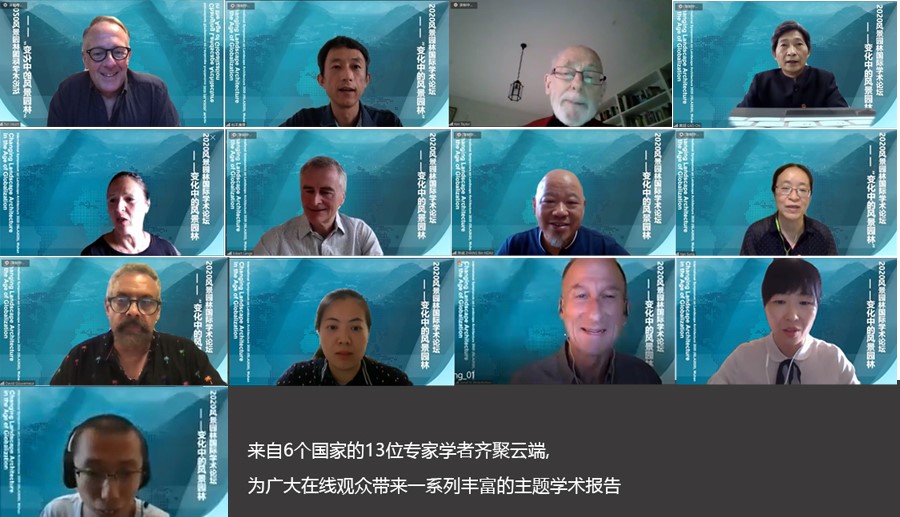
From August 25th to 26th, International Symposium on Landscape Architecture 2020(ISLA2020),Wuhan,“Changing Landscape Architecture in the Age of Globalization”was held online. The conference was jointly sponsored by Huazhong Agricultural University and Chinese Society of Landscape Architecture (CHSLA), organized by College of Horticulture&Forestry Sciences of Huazhong Agricultural University, and co-organized by Landscape Architecture Society of Hubei Province. Thirteen experts and scholars from six countries gathered online and brought a series of wonderful reports to more than 520 online viewers.
Professor Gao Chi, Vice-Chairman of CHSLA andChairProfessorofLandscapeArchitectureinHuazhong Agricultural University, and Vice-Principal Yang Shaobo attended the opening ceremony. Based on the reality of the COVID-19 and globalization, Gao Chi emphasized the social responsibility of landscape architects, and proposed that domestic and international academic exchanges and interdisciplinary cooperation should be strengthened to adapt to the new changes. On behalf of our university, Yang Shaobo expressed his warm welcome and gratitude to the participating experts, and pointed out that sustainable landscape architecture is an important symbol of the progress of human civilization, the quality of life and the improvement of happiness index. The opening ceremony was presided over by Professor Xu Qiang, Vice Dean of College of Horticulture&Forestry Sciences.

In the Symposium, thirteen scholars from China, Japan, Britain, France, the United States and Australia gave reports. The conference was divided into four parts, hosted by Professor Shao Jizhong, Associate Professors Wang Min,Zhu Chunyang and Du Yan from the Department of Landscape Architecture.
Professor Tim Health from the University of Nottingham, UK, mainly used London as an example to describe the changes in the use of vertical urban landscapes before and after the Covid-19, and pointed out that despite the many challenges there should be a future for well-designed vertical urban landscapes in high population density cities around the world. Yasutaka Matsumoto, a distinguished professor at Nanjing Tech University, focused on the changes of Tree House in Japanese traditional garden space in modern periods, emphasized the breadth and depth of cultural heritage protection. Professor Ken Taylor of the Australian National University used famous gardens at home and abroad as examples to divide organically evolved landscapes into two categories, and attached great importance to the artistic or cultural associations of cultural landscapes. Professor Armelle Varcin from the Ecole Nationale Supérieure d’Architecture et de Paysage de Lille, explained the local characteristics and traditional wisdom of the African Senegal Heritage in the process of globalization. Professor Eckart Lange from the University of Sheffield, UK, through recent approaches, theoretical foundations and case studies, underlined that landscape architects are (should be) trained to work on all scales. Professor Song Yan from the University of North Carolina at Chapel Hill, based on the analysis of the relationship between urban form, energy and health, explored opportunities for interdisciplinary cooperation between urban planning and landscape architectures. Professor David Gouverneur of the University of Pennsylvania used projects to inspire rethinking of the relationship between Metropolitan and rural areas, expressing his expectations and encouragement for young Chinese landscape architects. Professor Daniel Winterbottom from the University of Washington used practical cases to discuss the challenges faced by culture in the context of globalization, emphasizing the traditions and regional expression and explaining how to apply globalization to teaching and learning.
The scholars from Huazhong Agricultural University explained the theme of “Changing Landscape Architecture ” from multiple perspectives. Professor Gao Chi stressed the importance of thenature and culture systeminTerritorial Spaceunder the title of “lands apart, sky shared”. At the same time, taking the multi-scaled identification of landscape character types in Lushan and Wudang Mountain as an example,he analyzed the method of landscape character assessment in China. Professor Zhang Bin shared the design of “Ban shan Garden” on the campus of Huazhong Agricultural University. This design maximizes respect for thenature systemand excavated site memory. From the perspective of historical time and space, Associate Professor Wang Le combed the path of interpretation of the value of rural landscape heritage with historical events, space and elements as the main logical lines. Dr. Zhang Li based on Weibo check-in date and Baidu heat map data, analyzed the effects of factors on park use and the limitations of two geospatial datasets. Dr. Zhang Wei focused on the use of semantic segmentation model to calculate the visible green rate and conducted actual case study.
At the closing ceremony of the Forum, Jia Jianzhong, General Secretary of CHSLA, and Zhang Bin, Vice Dean of College of Horticulture&Forestry Sciences,gave a speech. Jia Jianzhong affirmed and thanked the scholars for their wonderful report, and suggested that landscape architecture should continue to develop on the basis of inheriting tradition, conform to the trend of the times, and continuously enrich the connotation of the discipline. Zhang Bin summarized the theme of the meeting, saying that in the context of rapid globalization,landscape architectsshould have greater responsibilities. The closing ceremony was presided over by Associate Professor Wu Xuefei, head of the Department of Landscape Architecture. On behalf of all teachers and students, he welcomed international scholars to visit Huazhong Agricultural University and Jingyuan Building for on-site guidance and exchanges, and look forward to seeing each other offline at an early date!
This Symposium is one of the important contents of the 2020 online international conference of the College of Horticulture&Forestry Sciences of Huazhong Agricultural University. It implements the concept of “global vision, local action and unique development”, maintains unblocked international academic exchanges during special periods, strengthens foreign cooperation and communication, and promotes the construction and development of distinctive disciplines.
writer
Checked by Zhang Bin

